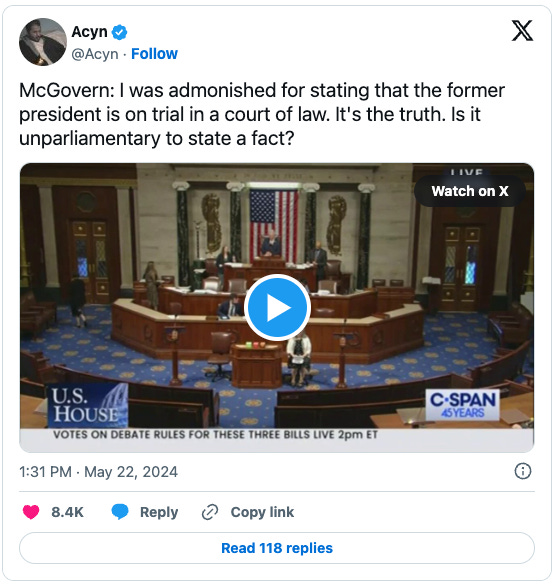If you don't know who George C. Marshall was, read up on him. He may have been the most important person of the second half of the 20th century.
Here's what Heather Cox Richard says about him in her daily blog, Letters from an American:
The Gettysburg Address it wasn’t.
Seventy-seven years ago, on June 5, 1947, Secretary of State George C. Marshall, who had been a five-star general in World War II, gave a commencement speech at Harvard University.
Rather than stirring, the speech was bland. Its long sentences were hard to follow. It was vague. And yet, in just under eleven minutes on a sunny afternoon, Marshall laid out a plan that would shape the modern world.
“The truth of the matter is that Europe's requirements for the next three or four years of foreign food and other essential products—principally from America—are so much greater than her present ability to pay that she must have substantial additional help or face economic, social, and political deterioration of a very grave character,” he said. “It is logical that the United States should do whatever it is able to do to assist in the return of normal economic health in the world, without which there can be no political stability and no assured peace. Our policy is directed not against any country or doctrine but against hunger, poverty, desperation and chaos. Its purpose should be the revival of a working economy in the world so as to permit the emergence of political and social conditions in which free institutions can exist.”
In his short speech, Marshall outlined the principles of what came to be known as the Marshall Plan to rebuild Europe in the wake of the devastation of World War II. The speech challenged European governments to work together to make a plan for recovery and suggested that the U.S. would provide the money. European countries did so, forming the Organization for European Economic Co-operation (OEEC) in 1948. From 1948 to 1952, the U.S. would donate about $17 billion to European countries to rebuild, promote economic cooperation, and modernize economies. By the end of the four-year program, economic output in each of the countries participating in the Marshall Plan had increased by at least 35%.
This investment helped to avoid another depression like the one that had hit the world in the 1930s, enabling Europe to afford goods from the U.S. and keeping low the tariff walls that had helped to choke trade in the crisis years of that decade. Marshall later recalled that his primary motivation was economic recovery, that he had been shocked by the devastation he saw in Europe and felt that “[i]f Europe was to be salvaged, economic aid was essential.”
But there was more to the Marshall Plan than money.
The economic rubble after the war had sparked political chaos that fed the communist movement. No one wanted to go back to the prewar years of the depression, and in the wake of fascism, communism looked attractive to many Europeans.
“Marshall was acutely aware that this was a plan to stabilize Western Europe politically because the administration was worried about the impact of communism, especially on labor unions,” historian Charles Maier told Colleen Walsh of the Harvard Gazette in 2017. “In effect, it was a plan designed to keep Western Europe safely in the liberal Western camp.” It worked. American investment in Europe helped to turn European nations away from communism as well as the nationalism that had fed World War II, creating a cooperative and stable Europe.
The Marshall Plan also helped Europe and the U.S. to articulate a powerful set of shared values. The U.S. invited not just Europe but also the Soviet Union to participate in the plan, but Soviet leaders refused, recognizing that accepting such aid would weaken the idea that communism was a superior form of government and give the U.S. influence. They blocked satellite countries from participating, as well. Forcing the USSR either to join Europe or to divide the allies of World War II put Soviet leaders in a difficult position and at a psychological disadvantage.
With a clear ideological line dividing the USSR and Europe, Europeans, Americans, and their allies coalesced around a concept of government based on equality before the law, secularism, civil rights, economic and political freedom, and a market economy: the tenets of liberal democracy. As Otto Zausmer, who had worked for the U.S. Office of War Information to swing Americans behind the war, put it in 1955: “America’s gift to the world is not money, but the Democratic idea, democracy.”
In the years after the Marshall Plan, European countries expanded their cooperative organizations. The OEEC became the Organization for Economic Co-operation and Development (OECD) in 1961 and still operates with 37 member countries that account for three fifths of world trade. And the U.S. abandoned its prewar isolationism to engage with the rest of the world. The Marshall Plan helped to create a liberal international order, based on the rule of law, that lasted for decades.
In his commencement speech on June 5, 1947, Marshall apologized that “I’ve been forced by the necessities of the case to enter into rather technical discussions.” But on the ten-year anniversary of the speech, the Norwegian foreign minister had a longer perspective, saying: “[T]his initiative taken by Marshall and by the American Government marked the beginning of a new epoch in western Europe, an epoch of wider, and above all more binding, cooperation between the countries than ever before.”
Not bad for an eleven-minute speech.
—


